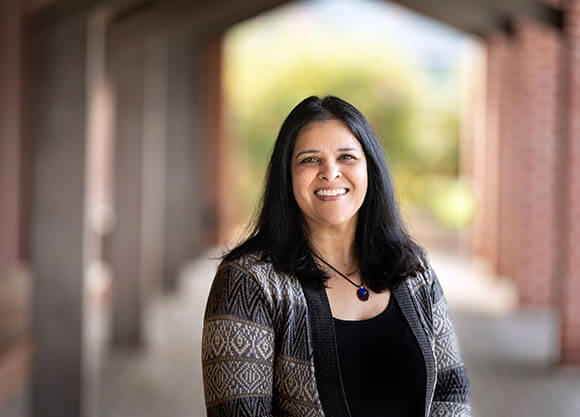
Community, curiosity and care: History professor earns top honor
October 07, 2025

October 07, 2025

For Prasad, the honor reflected not only her own accomplishments but also the community of colleagues and students who have shaped her journey.
“Even the way I was told I won says a lot about how we value good work in the classroom here. It wasn’t just an email, or a phone call or even a meeting with my unit head. The president, provost and the team took the time out of their schedules to tell me in person. That really made an impression, I was really touched,” said Prasad. “I feel like we’re all great teachers here. This was just the year that I got to be recognized.”
Prasad will be honored on Oct. 21 with the university’s highest teaching honor – the Center for Excellence award – along with five of her colleagues: Emily McCave, professor of social work and associate chair of social work; Dawn Colomb-Lippa, senior instructor of biology and adjunct professor, physician assistant studies; John Bau, assistant dean for student experience and career development; Sarah Driscoll, director of international student services; and Christie Soltys, assistant director, academic development and outreach.
Since joining Quinnipiac in 2007 as an assistant professor of history, Prasad’s teaching philosophy, rooted in collaboration and continuous learning, has shaped the way she guides every class.The result is a dynamic classroom where “students are empowered to think critically, communicate effectively and engage thoughtfully with the world around them.”
“My approach to fostering an active learning environment hinges on tackling form before content,” she said. “I first make sure students feel comfortable speaking freely with each other on relevant but low-stakes topics, and then I introduce historical literacy and analysis.”
That sense of comfort and curiosity is something her students notice right away. Her courses frequently blend traditional lectures with hands-on experiences that bring history to life. Early in the semester, students practice open conversation through “low-stakes” exercises, before moving into deeper discussions of power, race, class and culture.
In her Borders and Battles class, for example, debates over Israel-Palestine often feature students weaving in their personal experiences alongside historical analysis, guided by a classroom “Good Neighbor Compact” that ensures respectful dialogue.
Conrado Balagtas ’26, who nominated her for the award, shared:
“Dr. Prasad created an environment where the students learned in a different manner through different teaching methods … she made sure to incorporate historical games, comedic clips and activities that made the students feel the content was not too much. At the end of the day, Dr. Nita Prasad is just an amazing professor. She cares about her job, her students and her subject.”
Experiential learning extends well beyond the classroom. Field trips, simulations and interactive projects allow students to step into others’ shoes and witness history’s relevance firsthand. Assignments range from visual notes and short thematic responses to TikTok videos and board game redesigns, giving students multiple entry points into complex material.
It’s an approach that students say makes a lasting difference. Farah Alfaraj ’24, MAT ’25, spoke to that impact in her nomination:
“I worked as a Peer Catalyst with Dr. Prasad for two years. There are not enough words to praise Dr. Prasad’s commitment to her work and students, and I will always be grateful to her for invariably going the extra mile, whether it is for her students, PCs or colleagues.”
Her commitment to fostering understanding and engagement extends beyond the classroom into her scholarly work. Prasad’s research focuses on British colonial India; particularly how Indian women engaged with the colonial legal system and how Western medicine functioned within the British imperial project.
She has published widely on topics including women in the British colonial courts, diasporic communities in the Indian Ocean region, Hindu-Muslim relations, and Bollywood film. Her current project examines gender within the context of the British colonial medical establishment in India.
Prasad also directs the Asian studies minor and the Health, Medicine, and Society program, and since 2013, has held a joint appointment at Quinnipiac’s Frank H. Netter MD School of Medicine, where she helps coordinate the Medical Humanities concentration and teaches medical students.
One of her proudest contributions has been helping to develop the Health, Medicine and Society major.
“Collaborating with colleagues to build that major was really satisfying for me,” she said. “It’s something that I’ve been thinking about for a long time, and I was really happy to land in an environment where this kind of initiative would be supported because its time had come.”
She credits both the exchange of ideas and support from her colleagues for shaping her approach, emphasizing that being part of a collaborative academic community not only refines her teaching but also enriches the learning experiences of her students.
“My biggest asset as an instructor are my colleagues. Many of my assignments were inspired by conversations with faculty members here at QU, or by poring over teaching blogs authored by instructors at other institutions,” said Prasad. “Without my fellow faculty as inspiration, I would not be the instructor that I am today.”
Quinnipiac Today is your source for what's happening throughout #BobcatNation. Sign up for our weekly email newsletter to be among the first to know about news, events and members of our Bobcat family who are making a positive difference in our world.
Sign Up Now